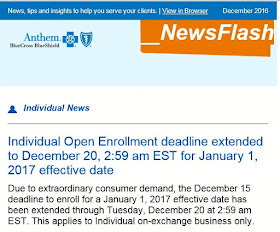As I wrap up another year in the insurance industry I would like to share a story with IB readers about why we do what we do in our “real jobs”. The story highlights the highs and lows we go through with our clients. It’s a story that most people never see because it’s the behind the scenes work that doesn’t make headlines or front page news. In fact, the likelihood is slim that this story would even be reported on. So, I’m asking you to please read on. If you enjoy the story, please share it with others.
I am blessed to have strong support staff that I work with every day. They are a huge part of a team that integrates benefits administration, human resource assistance, claims management services, and wellness coordination programs for our clients.

In July, we set up another wellness challenge for a client in coordination with their insurance renewal. These challenges have been very successful in the past and with this challenge we created a competitive environment with teams battling each other for a prize at the end (which I agreed to provide). The challenge ended at the end of August and the winning team of ten employees was looking forward to an evening at a comedy show.
Then came news that nobody could have imagined. One of the employees on the winning team had a family emergency. The employee’s daughter had an apparent emergency gall bladder attack. She was away at college when it began. That night, during the surgery, they found out this young 19-year-old had cancer. That was September 2nd. On September 5th, she was told that the cancer was in her abdomen and extremely aggressive. Treatment began right away. But unfortunately, just 31 days later the young lady passed away.
This is a very close employer with just over 60 employees in a small town. The wellness challenge was put on the back burner. That prize became irrelevant. The focus was now on helping one of their own. And we were there. Helping in ways that most employees didn’t even know.
From the day of diagnosis our team worked with the company ownership and management in guiding them with counsel through the FMLA process. As fundraisers were held during the month she went through treatment, the VP of Operations for the company came to us with a question and asked for our help. The VP wanted to know what financial responsibility the employee would incur under their company health plan. She also wanted to know how claims would process.
This is one of those “feeling punched in the stomach” moments in our business – one that many never face. The reality of this family saying goodbye to a loved one – especially a child – then facing the heaps of mail from doctors, hospitals, labs, and the insurance company. It’s overwhelming, painful, emotional, and creates stress and anxiety. All things we don’t want the family to face. So, we did what any broker can do. We asked the company if we could assist. We requested that the family send us all the mail they received.
That’s exactly what they did. The employee, after being gone for three weeks to be with her daughter, gathered all the mail and brought it to her employer. They sent a package to us via FedEx with a small stack of insurance company EOB’s and several bills from providers. Our team sorted and consolidated these statements and bills. We spent time on the phone with United Health Care, The James Cancer Center in Columbus, numerous provider offices, and many other places. These calls were made to have claims adjusted and reprocessed to make sure that this family didn’t have to bear any burden of fighting through a complex system. In the end, we came up with a final audit of all bills and patient responsibility. We were able to share with the family exactly what they owed and to whom. It gave them peace of mind in knowing that the insurance was there and would keep them from a financial catastrophe. It allowed them to grieve without additional emotional stress. It provided them with a voice that they could count on that was working in their best interest. In an email we received from the family this is what they had to say:
“Thank you for all your help with everything! Without your assistance, this process would have been a bigger headache on top of the emotional rollercoaster and devastation my family has went through. I just hope you realize how much you are appreciated and all the hard work you have done has helped our family tremendously!”
“Thank you so much for everything you do!”
Health insurance is important. The help we provide as a broker is essential. It is what we do. It’s the relationship. It’s the feeling of help and support. It’s knowing that we have a unique skill of understanding a complex system full of twists and turns that many of us take for granted.
Tomorrow is Christmas Eve. Next week it will be 2017. I will spend time these next ten days with my friends and family. It’s unlikely that I will spend time with my team. I hope they know how much I appreciate them and will never take them for granted. To Pam, Joan, Michelle, Lindsay, Sanaa, and Cindy, have a Merry Christmas and Happy New Year.
To my co-bloggers, Hank, Bob, Mike, Kelley, and Bill, as well as all of you who read my gibberish here at IB, Merry Christmas and Happy New Year to all of you.
Without your support I would be nothing more than a simple insurance agent. But with you we do great things. This story is just one example of the impact we have.














